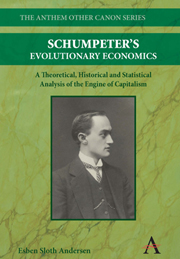 Schumpeter's Evolutionary Economics
Schumpeter's Evolutionary Economics Book contents
- Frontmatter
- Contents
- List of Figures
- List of Tables
- Preface
- Acknowledgements
- Abbreviations
- 1 Introduction
- I Equilibrium Economics and Evolutionary Economics
- 2 The Early Years
- 3 From Walrasian Statics To Evolutionary Dynamics
- 4 Elitist Dichotomies and General Evolutionary Analysis
- 5 Evolutionary Dynamics in the Capitalist Economy
- II The Evolutionary Trilogy
- III Works in Progress
- Appendices
- Schumpeter's Works
- Other References
- Index of Schumpeter's Works
- Index of Persons
4 - Elitist Dichotomies and General Evolutionary Analysis
from I - Equilibrium Economics and Evolutionary Economics
Published online by Cambridge University Press: 05 March 2012
- Frontmatter
- Contents
- List of Figures
- List of Tables
- Preface
- Acknowledgements
- Abbreviations
- 1 Introduction
- I Equilibrium Economics and Evolutionary Economics
- 2 The Early Years
- 3 From Walrasian Statics To Evolutionary Dynamics
- 4 Elitist Dichotomies and General Evolutionary Analysis
- 5 Evolutionary Dynamics in the Capitalist Economy
- II The Evolutionary Trilogy
- III Works in Progress
- Appendices
- Schumpeter's Works
- Other References
- Index of Schumpeter's Works
- Index of Persons
Summary
We can most easily understand Schumpeter's early move from the Walrasian system to his theory of economic and social evolution within capitalism on the background of elite theory. His knowledge of this kind of theory is beyond doubt. Thus his former student Eduard März (1991, 58) emphasised that “[a]nyone who knew Schumpeter personally can testify that he had a thorough knowledge of theories of the élite of the late nineteenth century (Nietzsche, Pareto, Mosca, Michels, Le Bon) and took pleasure in flirting with such ideas.” Actually, März's conclusion is that Schumpeter's “own theory of development was an attempt to give concrete economic substance to the vague theories of his time.” This conclusion can also be reached by reading Entwicklung I, as when McCrea (1913, 526), in his review of this book, suggested that it “offers a super-man interpretation of economic progress”. The theories of the elite were based on the contradistinction between the masses and the elite, and so were many of Schumpeter's early formulations. For him, economic agents can be divided into two groups that are characterised by different levels of competence and will:
The masses: “Most people tend to their usual daily business and have enough to do at that. Most of the time such people are on slippery ground and the effort to stand straight exhausts their energies and suppresses all appetite for further exploration. … The daily work keeps them down, organization as well as the influence of their colleagues inflict untearable chains on them. This is the masses.” (S1912a, 412–13; Entwicklung I, 162–3)
[…]
- Type
- Chapter
- Information
- Schumpeter's Evolutionary EconomicsA Theoretical, Historical and Statistical Analysis of the Engine of Capitalism, pp. 67 - 98Publisher: Anthem PressPrint publication year: 2009


